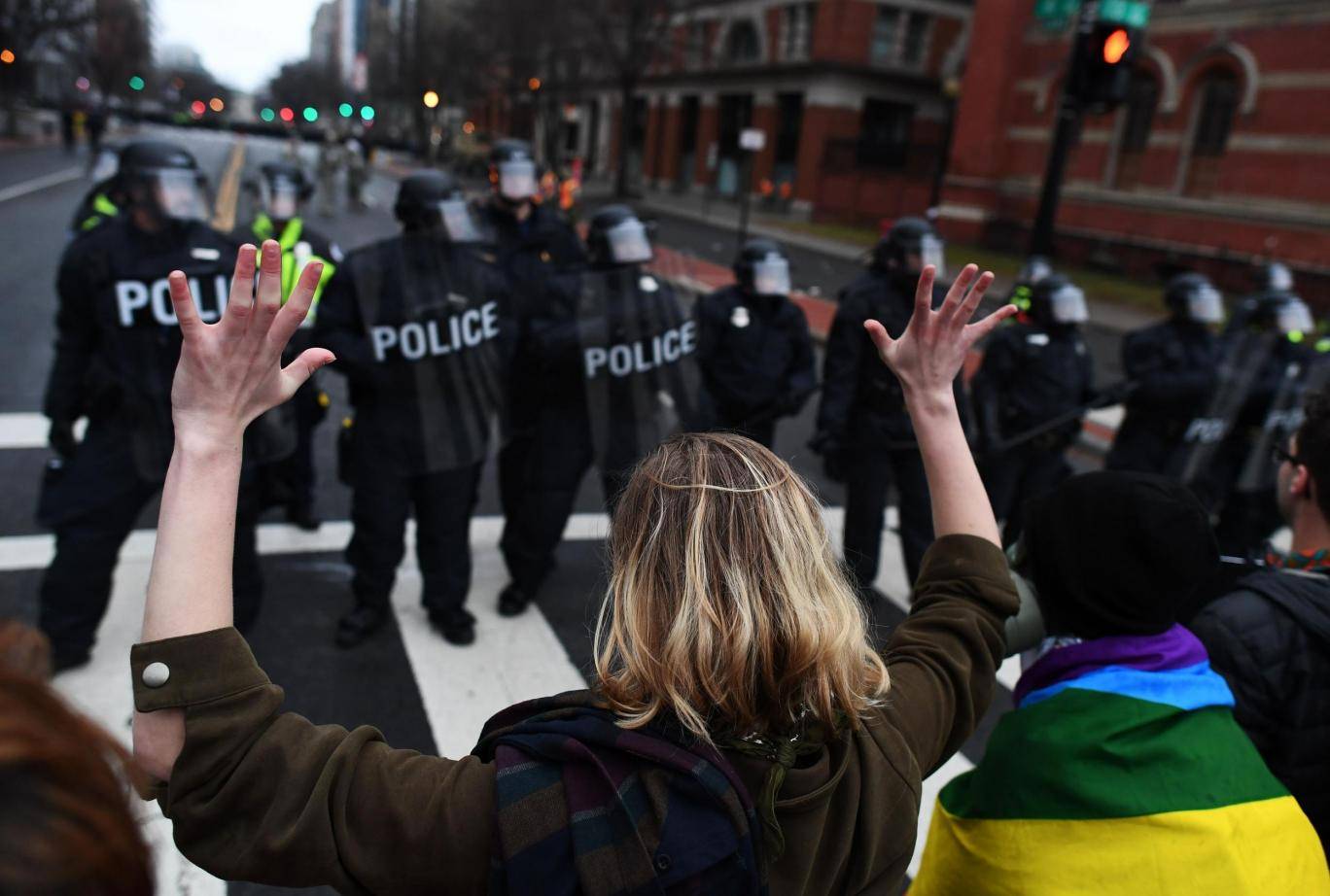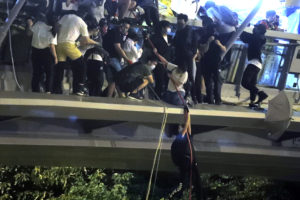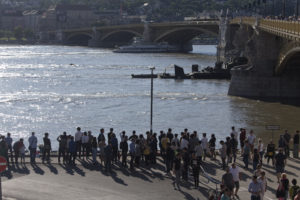Arrestees at Trump Inauguration Protest Could Face 60-Year Terms
"You don’t have to be the one who breaks the window to be guilty," a government attorney says in an opening argument. A protester holds her hands up as police officers line up during an anti-Trump demonstration in Washington. (Jewel Samad / Getty Images)
A protester holds her hands up as police officers line up during an anti-Trump demonstration in Washington. (Jewel Samad / Getty Images)
Thousands protested the Jan. 20 inauguration of Donald Trump, but only those who marched in an anti-fascist, anti-capitalist demonstration known as Disrupt J20 have been charged with felony rioting. Opening arguments for the first group to go on trial began Monday, with arguments for all of the nearly 200 defendants scheduled through October 2018.
In her opening statement, Assistant U.S. Attorney Jennifer Kerkhoff described the protests as “a sea of black masks” and argued, “You don’t have to be the one who breaks the window to be guilty.” She claims all those arrested “actively helped those with the hammers and crowbars” and were “playing a role in the violence and destruction.”
The Independent reports they could face 60 years behind bars if convicted and gives background context on the aims of Disrupt J20:
The Disrupt J20 protests consisted of several different activities scheduled for Inauguration Day – a “Festival of Resistance”, as organisers called it. The activities included a permitted march, an “Anticapitalist Bloc” march, and protests at various Secret Service security checkpoints.
The goal, organizers wrote on their website, was to “give expression to the massive opposition to Trump’s right-wing, racist, and misogynist agenda”.
“Organizers intend to demonstrate that people of conscience are the majority, and take steps towards organizing that sentiment into a force that can have an impact on Trump’s ability to claim a mandate, setting a tone of resistance for the coming years,” they wrote.
The Intercept adds legal background on the case:
The government may attempt to force members of the same defense into a situation in which their aims conflict with one another. “Defendants have to be careful, regardless of how they feel about particular parts of the indictments, that the prosecution’s case not hurt their fellow co-defendants,” said Sam Menefee-Libey, spokesperson for the Dead City Legal Posse, a support network for J20 arrestees that provides housing, court support, and other services to assist in their navigation of the capital’s judicial system.
The conflation of the protesters as a whole with the alleged violent acts of a few in the crowd is worrying to Menefee-Libby. It would be a “radical departure” from a basic understanding of the law, Menefee-Libby said, if the government prosecutes people solely for their proximity to criminality. “Individuals can only be held responsible for their own behavior,” said Menefee-Libby, describing a fundamental tenet of the U.S. justice system.
Attorney Shana Knizhnik, of the American Civil Liberties Union’s D.C. chapter, said, “Even if we take the government at their word, that members of the protest had unlawful goals, it’s undeniable they also had lawful goals.”
The Independent also notes that the protesters were arrested after some broke away from the group and smashed windows at nearby businesses. Some threw rocks, bricks and pieces of concrete, according to The Washington Post, while others assaulted a limousine driver and destroyed a government vehicle, according to the indictment.
As the protesters walked on, they were surrounded by Metropolitan Police Department officers, who swept them up in a formation known as a “kettle.” The Independent continues:
Four of the protesters have since filed a lawsuit claiming they were held in the kettle for seven to 16 hours, without food, water, or bathroom facilities. The police department said the allegations would be fully investigated.
A total of 217 people were arrested in connection with the protests, according to DC Interim Police Chief Peter Newsham. Mr Newsham claimed the protests caused “significant damage to a number of blocks in our city.” The US Attorney’s Office for DC later estimated the damage at more than $100,000.
Police Chief Peter Newsham, who oversaw the crackdown, told a local radio station that “all the police officers were outstanding in the judgment that they used.” In the month after the arrests, more than 200 participants were indicted on felony riot charges, and the Superior Court of the District of Columbia handed down a superseding indictment in April, adding more charges for 212 of the defendants. The Police Department defended its actions in a statement, alleging that those arrested had “engaged in acts of vandalism and several instances of destruction of property.”
During a July hearing, prosecutor Kerkhoff said it wasn’t necessary for defendants to have personally damaged property in order to be charged or convicted”: “A person can be convicted of rioting without breaking a window,” she said. “It is the group who is the danger, the group who is providing the elements.”
Other actions of the prosecution have also been challenged as inappropriate. For example, prosecutors have obtained warrants allowing them to inspect the social media accounts of the defendants, and another warrant sought a list of all visitors to an anti-Trump website promoting protests on Inauguration Day.
As a recent op-ed in The Guardian notes, the arrests of Trump protesters and questionable investigation into their private lives is in stark contrast to the official response to the white nationalist rally in Charlottesville, Va., in August:
Compare this crackdown with the government’s response to the pre-planned, armed violence and rioting by white supremacists and private militia groups in Charlottesville, Virginia.
There was no sweeping online dragnet to identify organizers who conspired to plan, promote, and carry out violence in Charlottesville – violence against people, not property.
Nor were all the participants in Charlottesville rounded up and charged with felony conspiracy to commit rioting – or charged as accessories to Heather Heyer’s murder. Instead, federal prosecutors have done little to nothing.
“How do prosecutors decide when to dust off the rioting statutes and whom to charge?” the article asks. “Apparently, the reasons for the alleged rioting are important.”
Many lawsuits have been filed against the D.C. police for unlawful and brutal arrests on Inauguration Day, though there is no information on when these will be taken to court.
Your support matters…
Independent journalism is under threat and overshadowed by heavily funded mainstream media.
You can help level the playing field. Become a member.
Your tax-deductible contribution keeps us digging beneath the headlines to give you thought-provoking, investigative reporting and analysis that unearths what's really happening- without compromise.
Give today to support our courageous, independent journalists.



You need to be a supporter to comment.
There are currently no responses to this article.
Be the first to respond.